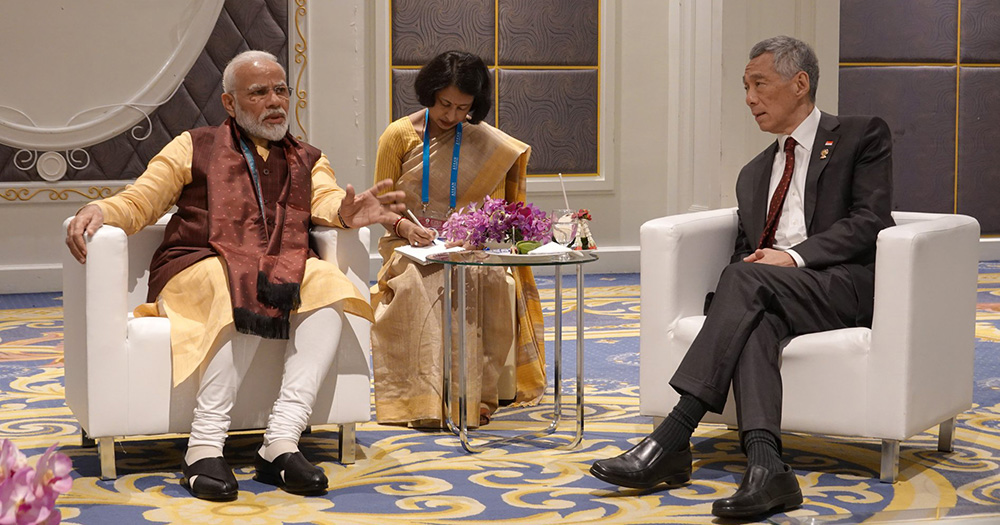Both India and the Association of Southeast Asian Nations (ASEAN) should "redouble" efforts to improve economic integration, Prime Minister Lee Hsien Loong said.
Relations between the two regions are currently good and involve "multi-faceted cooperation", he added, according to CNA.
PM Lee's comments were delivered on Nov. 3 at the 16th ASEAN-India Summit in Bangkok, which in turn was held as part of the 35th ASEAN summit.
A combined GDP of S$7.5 trillion
PM Lee further noted that both regions had a combined market of almost 2 billion people and more than S$7.5 trillion in terms of GDP, The Straits Times reported.
PM Lee voiced his hope for better transport connectivity with India, as he made reference to the pending ASEAN-India Air Transport Agreement and ASEAN-India Maritime Transport Agreement.
As per PM Lee, according to CNA:
"And related to this, in accordance with the Delhi Declaration, we can enhance economic opportunities by growing our transport connectivity. Therefore, I hope the ASEAN-India Air Transport Agreement and ASEAN-India Maritime Transport Agreement can be expeditiously concluded."
His sentiments were echoed by India's Prime Minister Narendra Modi, who said: "We are committed to improving our partnership, through better surface, maritime and air connectivity, and through digital links."
The Indian Prime Minister further elaborated that it was the aim of his country to increase the mobility of people for studies, research, trade and tourism.
Working together on environment-related issues
PM Lee also stated that he was keen for both India and ASEAN to work on environment-related issues.
PM Lee praised India for its efforts in mitigating climate change, through initiatives such as the Jal Jeevan Mission for water conservation, rainwater harvesting and water resources development.
PM Lee said:
"As a fellow maritime nation, Singapore fully shares India’s desire also to strengthen maritime cooperation, including through enhancing maritime connectivity, marine environmental protection and promoting the sustainable use of marine resources."
He further highlighted in a similar vein, ASEAN had also prioritised sustainable development as well, through initiatives such as the ASEAN Sustainable Urbanisation Strategy and the ASEAN Smart Cities Network (ASCN), CNA reported.
PM Lee added that he was keen for India to participate in ASCN and exchange views with the country on such issues.
Closer cybersecurity cooperation
PM Lee also touched on cybersecurity cooperation between the two regions, highlighting that both regions had a shared interest in areas such as regional peace.
PM Lee said Singapore was keen to "partner India to help strengthen the region’s cyber capacity and resilience", given that Singapore had just launched the ASEAN-Singapore Cybersecurity Centre for Excellence.
He said: "I look forward to partnering India to help strengthen the region's cyber capacity and resilience."
No mention made by India in concluding trade pact with ASEAN
ST highlighted that despite India also voicing its disagreement for increased engagement, no mention of the Regional Comprehensive Economic Partnership (RCEP) was made by Modi in his speech at the summit.
The RCEP is a trading agreement that will encompass 16 nations and consists of ASEAN along with China, India, Japan, South Korea, Australia and New Zealand.
Should the trade pact be implemented, it will be the world's largest free trade agreement and account for roughly one-third of the world's GDP.
The Guardian reported that India is resistant to signing the pact on the grounds that it will result in a flood of cheap Chinese-produced goods entering its economy, thereby hurting small businesses.
Additionally, domestic opposition within India to RCEP is also strong, according to ST.
Thailand has stated that the RCEP is expected to only be signed in 2020, rather than this year, according to CNA.
Top image from Lee Hsien Loong Facebook
If you like what you read, follow us on Facebook, Instagram, Twitter and Telegram to get the latest updates.
